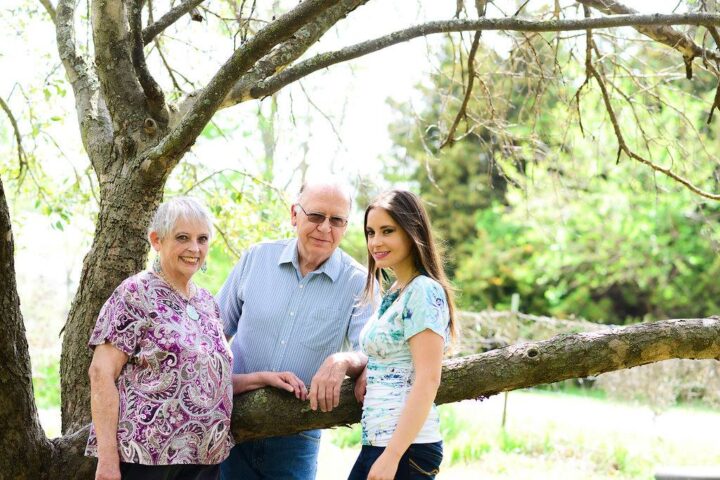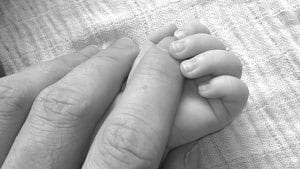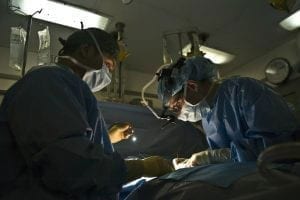Written by Jenny, Life’s a Polyp
I come from a long family line of individuals with familial adenomatous polyposis (FAP). My family though would learn the most about FAP because of me. In fact, we would learn a lot of things because of me and my experiences. We would learn the importance of self-advocacy, understanding our own diseases, community, and the need to focus on mental health in addition to physical health.
FAP is a genetic, rare disease that causes hundreds to thousands of precancerous colon polyps to develop at a younger age than the general population. These polyps will eventually turn cancerous, requiring colon removal at some point. FAP also has higher risks for several other cancers within and outside of the GI tract as well as several extra-colonic manifestations.
My medical experiences began when I was about seven; I started having chronic abdominal pain. My parents were on an HMO insurance plan though, which required a referral from my PCP for me to be seen by a GI specialist. My parents knew the importance of my need to be evaluated by a GI specialist – not only because I was having chronic abdominal pain but also because they knew there was a chance, I may have inherited FAP from my mom.
My parents didn’t realize the need for me to undergo any type of testing for FAP when I was born. My mother’s experience, growing up in the 1950’s, was that when she was a teen a proctologist would perform exams in the office to check for any polyps and burn any that he found. Occasionally she would undergo barium x-rays. My mother was found to have inherited FAP from her father and this was the testing and exam process she grew up with. Based off this understanding, she didn’t think I would need to be seen by a GI specialist until I was teen for evaluation for FAP. This all changed though with my chronic abdominal pain.
To my parents’ surprise, my PCP refused to refer me to a GI specialist knowing that not only did I have chronic abdominal pain, but I also had a family history of FAP. She told my parents there wasn’t anything wrong with me and I was “just a whiny child.” To circumvent this obstacle, my parents changed to a PPO insurance plan as soon as possible so that I wouldn’t require any referrals to see any specialists going forward.
My parents scheduled me with a pediatric GI specialist and upon hearing of my pain and my family history, she immediately scheduled me for an EGD, colonoscopy, and genetic testing for FAP. My tests confirmed that my abdominal pain was caused by my stomach being pre-ulcerous from stress, my colon had precancerous FAP polyps, and my genetic test also confirmed I had FAP. By age nine, my precancerous colon polyps were starting to turn cancerous, and I required my colon to be removed and was given a temporary ileostomy with the plan to reverse it into a jpouch later.
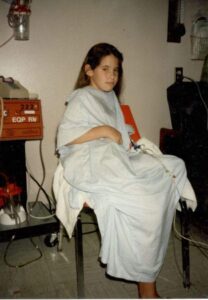
Unfortunately, I would experience a few complications within the first month of this surgery. Two weeks after surgery, my parents took me to the ER due to my incision becoming infected. I was restrained while ER providers cut open my incision to clean it and pack it without giving me sedation or effective pain management. A week later, I developed severe abdominal pain but was turned away at the ER by a doctor who didn’t find anything on an x-ray telling my parents I “was just a whiny child.”
My parents took me back to the ER again the next morning when a different doctor did more thorough testing to discover my small intestine had wrapped around itself and my surrounding organs, cutting off my blood supply. The ER providers told my parents they couldn’t believe I had survived the night with my blood supply cut off for so long. I required emergency surgery to remove my jpouch as it had died because of this complication. This caused me to develop another rare disease, short bowel syndrome. I would have another two surgeries before my first anniversary of my colon removal.
For the next six years, I lived with an ileostomy and suffered from medical PTSD, along with severe anger and depression from my medical experiences. It wasn’t until I was 14 that I asked to receive mental health counseling to help me process my medical trauma and learn healthy coping skills.
When I was 15, I was able to have my ileostomy reversed into a straight pull thru but would again experience life-threatening complications. During the year following my ostomy reversal, I began having chronic abdominal pain in addition to excessive vomiting and diarrhea resulting in severe weight loss, malnourishment, and electrolyte imbalances. My doctor told me later that she never knew if I would survive to see her at my next weekly appointment. I underwent months of medical testing in and out of state with no explanation to be found.
During this time, I developed a hole in my small intestine, requiring me to follow a strict nothing by mouth period and to receive TPN via a central line instead. I also received a full round of hyperbaric treatments to help the hole heal naturally. After exhausting all avenues, exploratory surgery was the last resort to try to identify what was happening to me. It was found that adhesions had created a stricture around my small intestine resulting in my excessive vomiting and diarrhea. It would take another 5 years for my body to stabilize following this 7th surgery. In the meantime, I continued to require frequent hospitalizations for blood transfusions and fluids to restore my electrolytes as my abdominal pain began to decrease in severity. 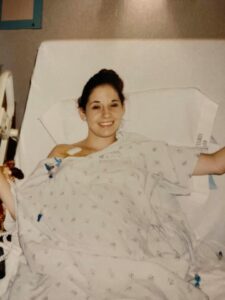
In 2015, I fell and hit my head because of low blood pressure from severe dehydration, resulting in hospitalization again. Following this fall, I began to have chronic nausea and increased abdominal pain. It was trial and error of multiple medications to find the best regiment to make my nausea and pain tolerable. In 2017, I would require months of medical testing again to discover I had a C. Diff infection. It was the last thing my doctor or I suspected as I didn’t have the typical symptoms of C. Diff.
In 2021, I underwent my eighth surgery to remove my gallbladder that was full of gallstones with the FAP precancerous polyps. This surgery would exacerbate my, at the time, undiagnosed abdominal migraine, requiring another stint of extensive medical testing over the course of nearly seven months with seven specialists. Now in 2023, I’ve once again been undergoing extensive medical testing in efforts to determine the cause of chronic vomiting.
I’ve never been a textbook patient for any of my health issues. This has required me to learn about my conditions and how to advocate for myself to receive the medical care I need. My medical experiences also led me to focus on helping others navigate their chronic illnesses. Part of this was establishing Life’s a Polyp, that follows my life with FAP and SBS, promoting education and patient empowerment2, as well as fundraising for FAP research. In 2015, I started the NORD FAP Research Fund to which I donate profits from Life’s a Polyp Shop that features a variety of products with designs for FAP, chronic illness, and rare disease. I wrote Life’s a Polyp with Zeke and Katie for children to learn about FAP, whether they or a loved one has FAP.
Through the years, I also learned that while I thought I was alone in my rare disease and ostomy experiences, I wasn’t in reality. There are ostomy support groups across the United States, the Youth Rally for teens with bowel and bladder diversions/dysfunction, and a multitude of online communities available. These groups helped me to learn self-acceptance of my medical conditions and how they’ve impacted my life. Being a part of such organizations and communities has been one of the most rewarding experiences of my life. With rare diseases, like many things, we’re stronger together than we are apart.
 Jenny inherited the rare, genetic colon cancer syndrome Familial Adenomatous Polyposis (FAP), which has also affected a long line of family members. Her medical experiences led her to become a Rare Disease Advocate and establishing Life’s a Polyp. She started the National Organization for Rare Disorders FAP Research Fund in 2015, to which she donates profits from Life’s a Polyp Shop and her FAP Children’s Book – Life’s a Polyp with Zeke and Katie. Jenny found purpose in helping others not go through the same medical and mental health experiences she had as a child.
Jenny inherited the rare, genetic colon cancer syndrome Familial Adenomatous Polyposis (FAP), which has also affected a long line of family members. Her medical experiences led her to become a Rare Disease Advocate and establishing Life’s a Polyp. She started the National Organization for Rare Disorders FAP Research Fund in 2015, to which she donates profits from Life’s a Polyp Shop and her FAP Children’s Book – Life’s a Polyp with Zeke and Katie. Jenny found purpose in helping others not go through the same medical and mental health experiences she had as a child.

